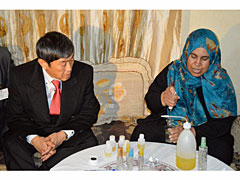JICA President Shinichi Kitaoka visited Iraq and Jordan from Jan. 25 to 29 in his first visit to the Middle East since assuming office.
1. Iraq visit: Mr. Kitaoka met with government dignitaries and announced continued assistance for Iraq's efforts to deal with difficulties.
Mr. Kitaoka visited Iraq from Jan. 25 to 27, holding talks with dignitaries including Prime Minister Haider Al-Abadi.

From left, JICA President Shinichi Kitaoka and Prime Minister Haider Al-Abadi of Iraq.
Iraq is experiencing many difficulties, including a prolonged unstable security situation and an increase in the number of internally displaced persons, as well as the current low price for the oil that supports Iraq's economy. During this visit, Mr. Kitaoka announced in talks with a series of dignitaries that JICA would continue its assistance for Iraq's efforts toward reconstruction and stability.
On Jan. 27, in his talks with Mr. Al-Abadi, Mr. Kitaoka expressed his respect for Iraq's continued efforts toward stability while confronting a variety of problems, and said JICA's policy is to continue its efforts centered on improving infrastructure and training human resources. Mr. Al-Abadi said he hopes for financial and other assistance from JICA to cope with the two external shocks: terrorism resulting from growing numbers of extremists, and the low oil price.
Mr. Kitaoka also held talks with President Fuad Masum; Salim Abdullah Ahmed Al-Jubouri, speaker of the Iraqi Council of Representative; Ibrahim Al-Jaafari, minister of Foreign Affairs; Hoshyar Mahmoud Mohammed Zebari, minister of Finance; and Salman Ali Hassan Al-Jumaili, minister of Planning. Mr. Kitaoka affirmed that JICA will contribute to improving public services amid an unstable regional situation. He also said it will contribute to maintaining the integrity of Iraq. He affirmed that JICA will work to make steady progress on joint projects currently underway. Mr. Kitaoka also held talks with the diplomatic corps and related parties in each country and discussed international policies to support Iraq.
Mr. Kitaoka also had a discussion with members of the JICA Alumni Association of Iraq (JAAI), an association of JICA training alumni. JAAI is quite active despite the various restrictions it faces, such as holding regular study meetings. In December 2015, JAAI was one sponsor of a Japan-Iraq academic exchange symposium held in Basra. Mr. Kitaoka said he hopes Iraq’s JICA training participants will be central to the ongoing relationship of friendship between Japan and Iraq.
2. Jordan visit: Mr. Kitaoka confirmed the importance of the role Jordan plays in the stability of the Middle East by accepting refugees.
Mr. Kitaoka visited Jordan from Jan. 27 to 29. After being granted an audience with King Abdullah II bin Al-Hussein, Mr. Kitaoka held talks with government dignitaries and visited the sites of JICA projects.

JICA President Shinichi Kitaoka, center, and King Abdullah II bin Al-Hussein of Jordan, right
On Jan. 28, Mr. Kitaoka was granted his audience with King Abdullah in the capital of Amman. Mr. Kitaoka spoke about the importance of the role played by Jordan — which is surrounded by Palestine, Iraq, Syria and other countries — in the stability of the Middle East, and he discussed JICA’s cooperation toward Jordan with the king. Refugees from Syria now make up more than 10 percent of the population of Jordan. To reduce the burden on the government of Jordan and the host community, JICA is carrying out Development Policy Lending and grant aid in the water service sector. In addition, it continues to deploy comprehensive cooperation at the grassroots level through assistance for refugees and persons with disabilities, as well as the dispatch of Japan Overseas Cooperation Volunteers (JOVCs). Mr. Kitaoka said Japan would like to continue its close relationship with Jordan through cooperation in various sectors. In response, King Abdullah expressed his appreciation for past support from Japan and JICA, and said he hopes for Japan to make its presence felt in the Middle East.
Mr. Kitaoka also visited the Palestinian refugee camp Al-Baqa’a, located in Jordan. Palestinian refugee camps formed in Jordan during the 1948 Arab–Israeli War and the Six-Day War (in 1967), and today more than 370,000 Palestinian refugees live in 10* refugee camps in the country. Mr. Kitaoka visited the site of a project aiming to improve the livelihoods of refugee women in a camp and visited the home of a woman who has increased her income by selling homemade perfume. Some women who received training in the project expanded the market for a high quality perfume made in the refugee camp overseas to help support their families.

JICA President Shinichi Kitaoka visits the home of a woman in a Palestinian refugee camp in Jordan. She is demonstrating perfume making.
On Jan. 29, Mr. Kitaoka had a face-to-face meeting with three JOCVs active in a camp for Syrian refugees. The JOCVs engage in handicrafts, music, play, learning, sports and other activities with Syrian refugee children suffering from mental and physical stress due to being in the closed environment of a refugee camp. They offer them an opportunity to open their hearts and enjoy themselves while teaching them through these activities the importance of being cooperative and obeying rules. Mr. Kitaoka confirmed the current situation of Syrian refugees living in the refugee camp and saw for himself the activities of the JOCVs who energetically rush around the camp.
*There are 10 camps certified by the United Nations Relief and Works Agency for Palestine Refugees in the Near East (UNRWA) and three certified by the government of Jordan.




scroll